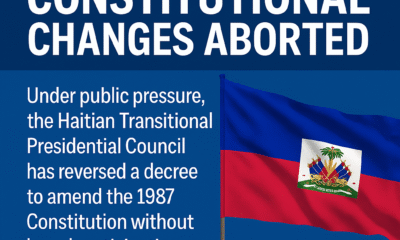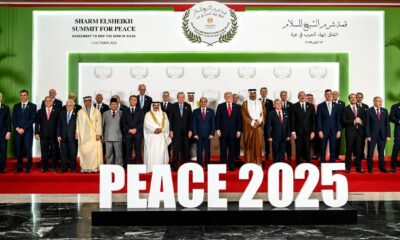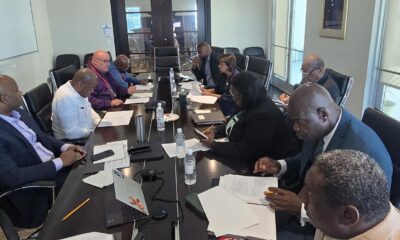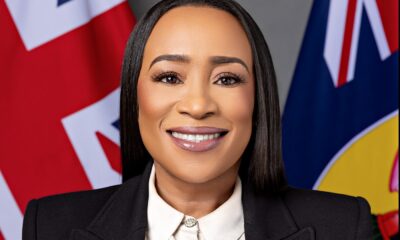By Deandrea Hamilton | Magnetic Media
October 14, 2025 – It’s being called political theatre — but for citizens, constitutional watchdogs, and democracy advocates across the Caribbean, it feels far more serious. Within a single week, two national parliaments — in Trinidad and Tobago and St. Kitts and Nevis — descended into turmoil as opposition members stormed out in protest, accusing their Speakers of bias, overreach, and abuse of parliamentary procedure.
For observers, the walkouts signal a deeper problem: erosion of trust in the very institutions meant to safeguard democracy. When Speakers are viewed as political enforcers instead of neutral referees, parliaments stop functioning as chambers of debate and start performing as stages for power and spectacle — with citizens left wondering who, if anyone, is still accountable.
October 6: St. Kitts Parliament Erupts
The first walkout erupted in Basseterre on October 6, 2025, when Dr. Timothy Harris, former Prime Minister and now Opposition Leader, led his team out of the St. Kitts and Nevis National Assembly in a protest that stunned the chamber.
led his team out of the St. Kitts and Nevis National Assembly in a protest that stunned the chamber.
The flashpoint came as the Speaker moved to approve more than three years’ worth of unratified parliamentary minutes in one sitting — covering 27 meetings and three national budgets — without individual review or debate.
Dr. Harris called the move “a flagrant breach of the Constitution and parliamentary tradition,” warning that the practice undermines transparency and accountability. “No serious parliament can go years without approving a single set of minutes,” he said after exiting the chamber.
The Speaker defended the decision as administrative housekeeping, but critics were unconvinced, branding the move a “world record disgrace.” The opposition’s walkout triggered renewed calls for the Speaker’s resignation and sparked a wider public discussion about record-keeping, accountability, and respect for parliamentary norms in St. Kitts and Nevis.
October 10: Trinidad Opposition Follows Suit
Four days later, on October 10, 2025, the Opposition United National Congress (UNC) in Trinidad and Tobago staged its own walkout from the House of Representatives in Port of Spain.
The UNC accused the Speaker of partisan bias, claiming she had repeatedly blocked urgent questions, ignored points of order, and allowed government members to breach standing orders without consequence.
“The Speaker has failed in her duty to act impartially,” the Opposition declared in a statement. “Parliament is not the property of any political party or Presiding Officer.”
The dramatic exit was seen as a culmination of months of rising tension and frustration, with opposition MPs arguing that parliamentary rules were being selectively applied to silence dissenting voices.
Political analyst Dr. Marcia Ferdinand described the twin walkouts as “a warning sign that parliamentary democracy in the Caribbean is teetering on the edge of performative politics.”
“When chairs become political shields rather than constitutional referees,” she said, “democracy becomes theatre, not governance.”
A Pattern Emerging
While St. Kitts and Trinidad are very different political environments, both incidents point to the same regional fault line: the perception that Speakers — the guardians of parliamentary order — are no longer impartial.
In Westminster-style systems like those across the Caribbean, the Speaker’s authority depends not on power but on public confidence in fairness. Once that credibility erodes, parliamentary control collapses into confrontation.
Governance experts say the implications are serious: eroded trust between government and opposition, declining public confidence in state institutions, and growing voter cynicism that “rules” are flexible tools of political advantage.
Why It Matters
Parliamentary walkouts are not new in the Caribbean, but what makes these recent events different is their frequency and intensity — and the regional echo they’ve created. Social media has amplified images of lawmakers storming out, with citizens from Barbados to Belize questioning whether the same erosion of decorum could be happening in their own legislatures.
the regional echo they’ve created. Social media has amplified images of lawmakers storming out, with citizens from Barbados to Belize questioning whether the same erosion of decorum could be happening in their own legislatures.
Analysts warn that if this perception takes hold, it risks diminishing the moral authority of parliamentary democracy itself.
“Once opposition MPs believe the rules are rigged, and once citizens believe Parliament is just performance,” said one Caribbean governance researcher, “you’ve lost the most valuable currency in democracy — trust.”
Restoring Balance
Political reformers across the region are calling for tighter Standing Order enforcement, independent parliamentary service commissions, and training to strengthen Speaker neutrality. Civil society leaders say the public must also play its part by demanding transparency and refusing to normalize partisan manipulation of parliamentary procedure.
Whether these twin walkouts become catalysts for reform — or simply another episode of Caribbean political theatre — will depend on what happens next inside those chambers.
For now, democracy watchers agree on one thing: when opposition leaders feel the only way to be heard is to walk out, the entire democratic house — not just its Speaker — is in danger of collapse.
Angle by Deandrea Hamilton. Built with ChatGPT (AI). Magnetic Media — CAPTURING LIFE.


 Caribbean News1 week ago
Caribbean News1 week ago
 TCI News1 week ago
TCI News1 week ago
 Bahamas News1 week ago
Bahamas News1 week ago
 TCI News1 week ago
TCI News1 week ago
 world news1 week ago
world news1 week ago
 TCI News1 week ago
TCI News1 week ago
 TCI News1 week ago
TCI News1 week ago
 TCI News1 week ago
TCI News1 week ago











